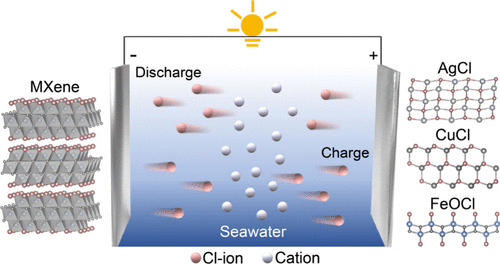
Abstract
Rechargeable aqueous chloride-ion batteries (ACIBs) using Cl– ions as charge carriers represent a promising energy-storage technology, especially when natural seawater is introduced as the electrolyte, which can bring remarkable advantages in terms of cost-effectiveness, safety, and environmental sustainability. However, the implementation of this technology is hindered by the scarcity of electrodes capable of reversible chloride-anion storage. Here, we show that a Ti3C2Clx MXene with Cl surface terminations enables reversible Cl– ion storage in aqueous electrolytes. Further, we developed seawater-based ACIBs that show a high specific capacity and an exceptionally long lifespan (40000 cycles, more than 1 year) in natural seawater electrolyte. The pouch-type cells achieve a high energy density (50 Wh Lcell–1) and maintain stable performance across a broad temperature range (−20 to 50 °C). Our investigations reveal that the covalent interaction between Cl– ions and Cl-terminated MXene facilitates Cl– ion intercalation into the MXene interlayer, promoting rapid ion migration with a low energy barrier (0.10 eV). Moreover, this MXene variant also enables the reversible storage of Br– ions in an aqueous electrolyte with a long cycle life. This study may advance the design of anion storage electrodes and enable the development of sustainable aqueous batteries.
See more: https://pubs.acs.org/doi/10.1021/jacs.4c07809